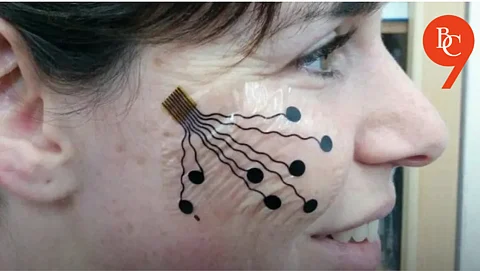

The world of wearable technology is on the brink of an extraordinary leap. Imagine a future where managing your mental health is as simple and as discreet as wearing a temporary face tattoo. Scientists and engineers are developing ultra-thin, skin-like biosensors that can be applied to the face, acting as “tattoos” to continuously monitor mental stress. This innovation could redefine how we understand, track, and manage our well-being.
Unlike traditional wearables like smartwatches or fitness bands, these new biosensors are designed to be nearly invisible and incredibly comfortable. Printed with advanced electronic materials, the face tattoo adheres gently to the skin, often on the temple, jawline, or forehead. It measures subtle physiological signals such as sweat composition, skin temperature, and tiny muscle movements that are closely linked to stress and emotional states.
These sensors use microelectronics and wireless technology to transmit real-time data to your smartphone or a connected device. The result? Instant feedback on your mental stress levels, delivered straight to your fingertips.
The face is a rich source of physiological information. Tiny changes in facial temperature, moisture, and muscle tension can reveal a lot about our emotional state. By monitoring these signals, the smart tattoo can detect rising stress before you’re even consciously aware of it.
This real-time insight is a game-changer for mental health. Early detection allows users to take proactive steps like practicing mindfulness, adjusting their environment, or seeking support before stress escalates into anxiety or burnout.
Imagine getting a gentle notification when your stress levels spike, along with personalized tips for relaxation or breathing exercises. Over time, the tattoo can help you identify patterns and triggers, empowering you to take control of your mental health.
Employers are increasingly concerned about employee well-being. These face tattoos could provide anonymized, aggregate data to help organizations design healthier work environments while respecting individual privacy.
For therapists and doctors, continuous stress monitoring could offer valuable insights into a patient’s mental health journey, improving diagnosis and treatment for conditions like anxiety, PTSD, and depression.
As with any health technology, privacy is paramount. Developers are working to ensure that all data is encrypted and that users have full control over who can access their information. The goal is to create a tool that empowers individuals never one that invades their privacy.
Prototypes of these smart face tattoos are already being tested in research labs worldwide. Experts predict that commercial versions could hit the market within the next two to three years, pending regulatory approval and further refinement.
